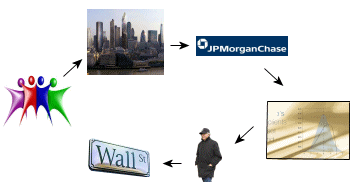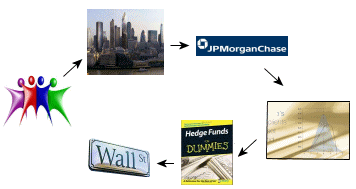What was the problem that lead us to this economic cliff? Why were houses so overvalued? Why were loans so easy to come by? Why were we paying $4.00+/gallon for gasoline? I think a piece of this article in the New York Times contains the real answer to the question. It’s about J.P. Morgan’s timely decision to exit Madoff funds shortly after the Market fell, but before Madoff was exposed. They pulled out the Bank’s money, but didn’t alert their clients [who are kind of upset about it]:
The tale began several years ago when a unit of JPMorgan Chase in London issued a series of complex derivatives that gave investors a way to triple their bets on the Fairfield funds, whose solid consistency mirrored the track record that had quietly — and ruinously — drawn investors to Mr. Madoff for decades.
Leveraged notes issued by big banks like JPMorgan Chase and Nomura became conduits through which fresh money flowed from institutional investors into the Fairfield Sentry and the euro-based Fairfield Sigma funds, both run by the Fairfield Greenwich Group — and, in turn, into Mr. Madoff’s hands.
The arrangement worked like this: Investors put up cash to buy the notes from the bank. In return, the bank promised to pay them up to three times the future earnings of the Fairfield funds. When the notes matured in five years, assuming the funds did well, these investors would get more than if they had invested in the funds directly. The bank collected just under 2 percent in fees, investors said.
And because the bank had to hedge its entire risk, it put up to three times the face amount of the notes into the Fairfield funds. Thus, Fairfield Greenwich got more cash to manage than it otherwise would have, increasing its own fee income. To reward note-holders for making that possible, Fairfield paid them a so-called rebate of a fifth to a third of a percentage point a year, according to documentation of those transactions.
The first sign of trouble came in early October, when Fairfield Greenwich notified investors that it would no longer pay them rebates…

This story is tragic because we know in advance that it contains a con-man, Bernard Madoff. But what if we replace him with a "legitimate" Hedge Fund?

First, that adds another layer of Financial Institutions "playing with money." But is it really any different? No matter how you draw the figure, everyone is extracting money from a system that is supposed to be a contract between the "public" and "business." But the real business has become the Financial industry that handles the money – and it’s a very lucritive business indeed.
Even without Madoff, this cannot continue. The net conclusion of this story is very simple. The people and the businesses have been taken out of the center of things. Capitalism has been replaced by Financialism. And the economy is too weak from chronic Financial Piracy to allow it to continue. The buried Treasure is all gone.
The tale began several years ago when a unit of JPMorgan Chase in London issued a series of complex derivatives that gave investors a way to triple their bets on the Fairfield funds, whose solid consistency mirrored the track record that had quietly — and ruinously — drawn investors to Mr. Madoff for decades.Leveraged notes issued by big banks like JPMorgan Chase and Nomura became conduits through which fresh money flowed from institutional investors into the Fairfield Sentry and the euro-based Fairfield Sigma funds, both run by the Fairfield Greenwich Group — and, in turn, into Mr. Madoff’s hands.
The arrangement worked like this: Investors put up cash to buy the notes from the bank. In return, the bank promised to pay them up to three times the future earnings of the Fairfield funds. When the notes matured in five years, assuming the funds did well, these investors would get more than if they had invested in the funds directly. The bank collected just under 2 percent in fees, investors said.
And because the bank had to hedge its entire risk, it put up to three times the face amount of the notes into the Fairfield funds. Thus, Fairfield Greenwich got more cash to manage than it otherwise would have, increasing its own fee income. To reward note-holders for making that possible, Fairfield paid them a so-called rebate of a fifth to a third of a percentage point a year, according to documentation of those transactions.
The first sign of trouble came in early October, when Fairfield Greenwich notified investors that it would no longer pay them rebates…
Sorry, the comment form is closed at this time.